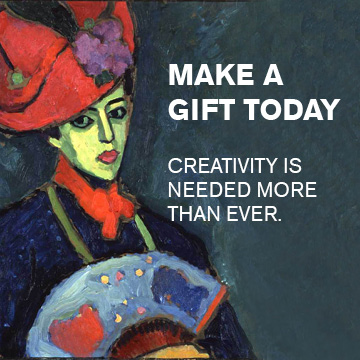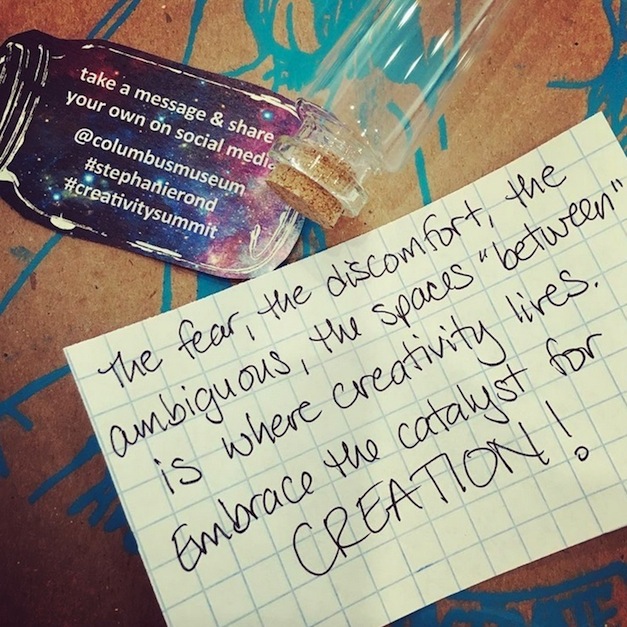
When I last wrote, I was tittering with excitement for the Creativity Summit, a once-in-a-lifetime convening of incredible thinkers and questioners both on the stage and in the audience. Since then I have read hundreds of response forms, tweets, sticky notes, and other ways that participants made their thinking visible. These are artifacts of participants’ willingness to be vulnerable and take risks, to be playful and serious, to consider and reconsider, to navigate ambiguity, to fail, to resist the lure of easy answers, and share this process in a spirit of generosity and collaboration. These are the behaviors that creativity demands, and they show through in the insights and questions participants left behind.
Here I want to share a tiny handful of the insights and questions that spoke to me. I hope they will spark thinking and wondering, and reveal some of what inspires me every day as I work with the CMA team, our visitors, and our partners to ask what creativity looks like, and how we might better support it for ourselves and others.
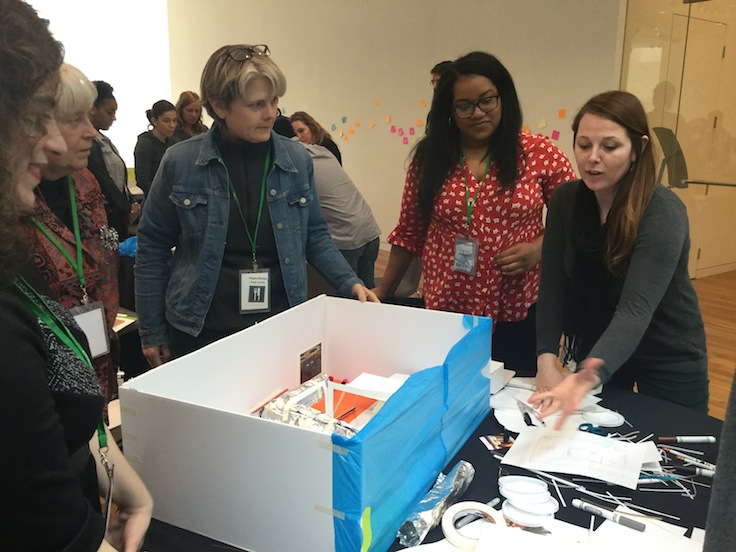
Designer and Futurist David Staley challenged the room to design a school re-imagined for creativity.
We asked people to wonder…
At CMA, we emphasize questioning as a creative behavior. This was in full force throughout the Summit, especially as author Warren Berger led everyone to generate our own “most beautiful question.” Here are just a few:
How might we educate our communities about the importance of creativity, and harness the momentum to effect change?
How might we inspire curiosity and creativity by making it safe and acceptable to ask questions in our culture?
How might we cultivate creativity by acknowledging differences without judgement, and creating an open and brave space for individual and group ideas?
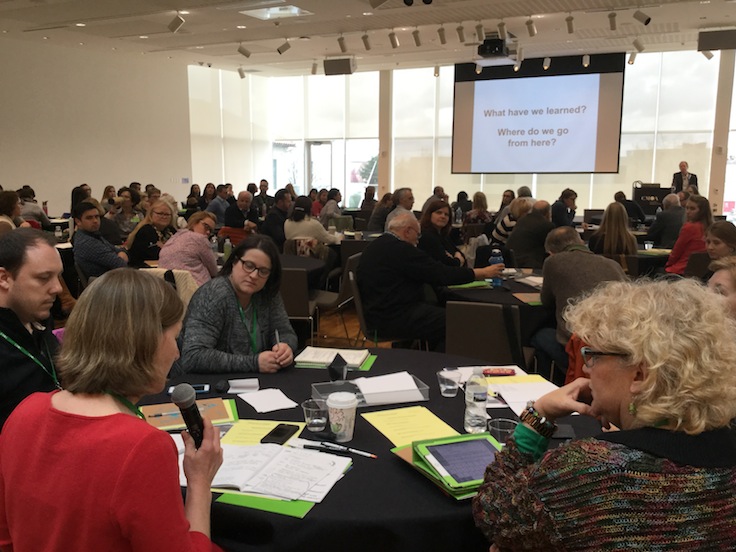
Audience members, including Emily Reiser of the Making Creativity Visible Initiative, shared their groups’ “beautiful questions” with author Warren Berger.
We asked people to reflect…
John Dewey famously said “We do not learn from experience…we learn from reflecting on experience.” In that spirit, we asked participants to tell us one way they were thinking differently about creativity:
Diversity leads to increased creativity…some creativity comes from dissension.
I have a new sense of understanding that creativity can be both deeply personal and collaborative, evoke both vulnerability and a sense of safety, technologically inspired and still human.
I am thinking differently in my practice in that I am thinking about promoting and fostering creative thinking versus taking “art” and art students as creative in and of itself/themselves.
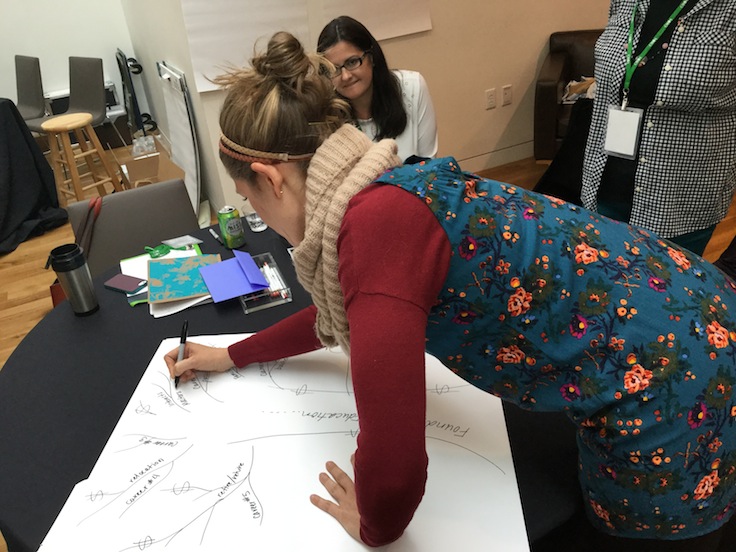
Katherine Prince, Senior Director of Strategic Foresight for KnowledgeWorks, engaged participants in exploring the implications of possible futures for learning.
…And we asked people to #share
Each day we asked participants to use our hashtag to share what was sticking. The response was amazing – #CreativitySummit was trending on Twitter on April 7 and 9; I encourage you to search #CreativitySummit to get a bigger picture of the event.
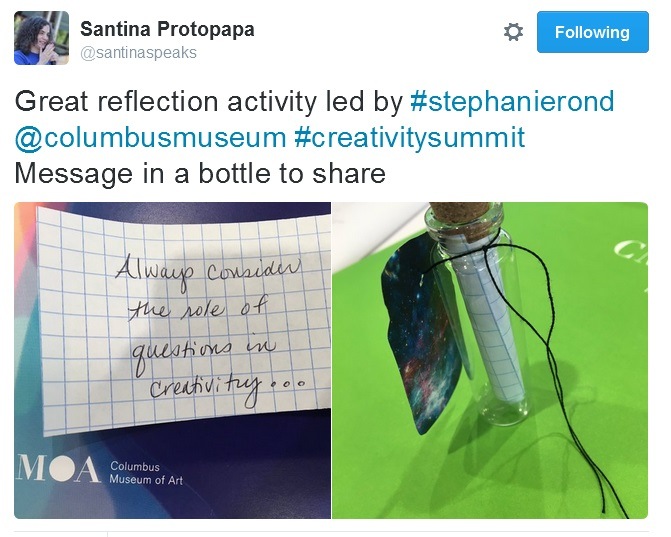
Here’s a taste of what thoughts resonated:
The decisions we make on a day-to-day basis either create conditions for creativity to thrive or stifle it. – Cindy Foley
“The comfortable expert must become the restless learner” – Warren Berger
Condition of creativity: Permission to be wrong. – Artie Isaac
“Same people assume same ideas and perspectives” – Melissa Crum
“Diversity should be scrutinized across all dimensions & platforms to make sure we get the best ideas” – Marshall Shorts
“We empower people to do the work that they know in their hearts is right for children.” – Todd Hoadley
“We think about our students changing the world in big and small ways.” – Trent Bowers
“Creativity will differentiate humans from robotic counterparts – Katherine Prince
“The world doesn’t care how much you know. The world cares what you DO with what you know” – Tony Wagner
This last comment brings me back to the first morning when Sean Foley asserted, “You can choose to leave here today and see the world in different ways.” As I set back out to show the world “what I can do with what I know,” I will be guided by the many voices of the Summit, and by the beautiful question, “How might I help myself and others see the world in different ways?”
[Feature photo by @gladannie]
